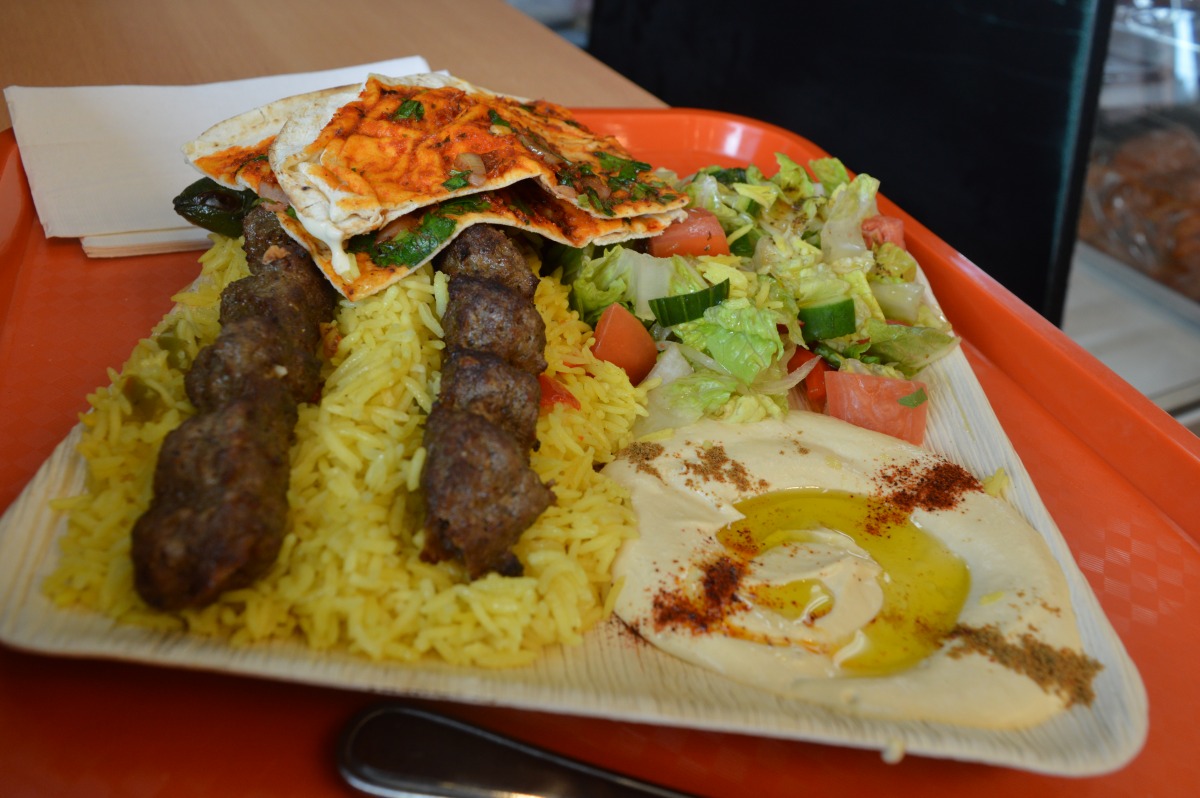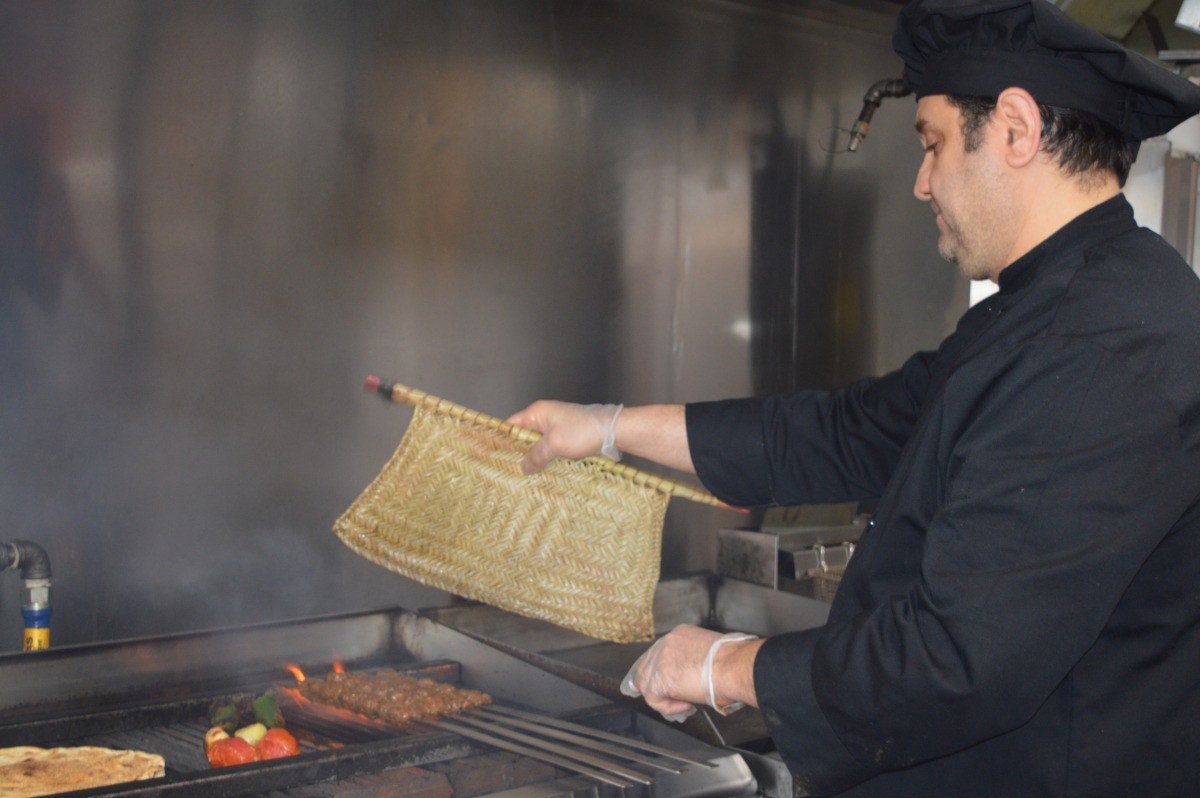Syrian refugee and restauranteur Zakaria Mokdad settled in Canada with help from George Brown College staff member Daphne Bonar
“My dream was to open a restaurant to relive my experience here because I had my own restaurant back home,” said Zakaria Mokdad, a Syrian refugee, who opened Aleppo Kebab in Scarborough a month ago.
Mokdad’s desire began as soon as he set foot in Canada with his family in August 2016 when they left Jordan, where they had originally fled to escape Syria’s civil war.
The Syrian civil war began in 2011, and Mokdad was worried for the safety of his family.
In 2012, they left Syria under the cover of midnight, walking for three hours to the Jordanian border.
The Jordanian army brought them to a refugee camp, but Mokdad decided to leave after three days. It was not where he wanted his children to be.
They moved to Jordan’s capital and stayed there for another three years when they were selected by a group of Canadians who were looking to sponsor 100 families.
Project Toronto Welcome, Mokdad’s sponsor, thoughtfully provided his family with Syrian food.
Mokdad’s fear of never eating Middle-Eastern food again was gone the moment they ate the Manakish, a type of flatbread, that was served upon arrival.
“The bread they gave us was the best,” said Mokdad but was quick to add “nothing will taste like home.”
Mokdad said his customers often tell him “you remind us of home. You remind us of Aleppo. You remind us of Syria.”
Many Syrian refugees settled in the Scarborough neighbourhood of Wexford, where Aleppo Kebab is located.
Throughout their first year in Canada, Mokdad’s family received generous support from people in the sponsorship group who still visit from time to time.
One of those people was Daphne Bonar, a manager in the academic excellence division at George Brown College.
Mokdad’s first message to Bonar was, “I can’t wait for us to get settled in Canada so we can help people the way you are helping people.”
She is still touched by these words.
Bonar initially had trouble connecting with people to get involved with sponsoring a Syrian family.
Through a friend’s connections, she joined Debbie Ricks, who organized a sponsorship group.
“I just got connected to this group and it was full of a lot of really committed, hands-on people who brought a whole variety of expertise,” said Bonar.
The sponsorship group was asked to go to Ryerson University in partnership with their Lifeline Syria program to select a family.
After looking through a series of folders, Mokdad’s family was chosen.
A few people in the group had prior restaurant and hospitality experience, and seeing that Mokdad had a restaurant back in Syria, it made sense to choose his family.
At the time, however, they were unaware his family consisted of eight people.
The success rate of sponsorship for larger families is low, so while in Jordan, Mokdad sent out two applications for his extended family, which was an additional four people he could not leave.
Through a Skype meeting, Mokdad revealed, “I’m not leaving Jordan without them.”
The sponsorship group understood his reasoning and tried their best to do what they could to help by combining both applications into one, with legal support lengthening the process.
“Zakaria is really quite an entrepreneur,” said Bonar. “He’s incredibly social and he makes connections and has a giant network of people that he knows and I just think all of those kinds of characteristics about him are going to help him succeed.”

Aleppo kebab with rice, hummus beiruti and salad. Photo: Ladshia Jeyakanthan / The Dialog.
Before Mokdad got into the restaurant business in Syria, he would talk to tourists and guide them through the ancient city of Bosra, where travellers often stopped by.
“I picked up the language (English) from the tourists,” said Mokdad, who can also speak French.
He later realized the tourists were often hungry after their long day, and begun cooking for them from the comfort of his home.
Mokdad was a young man in his twenties, and after two years, he started his own restaurant because of the need for more restaurants for the tourists that visited.
At the start, he fed 20 people. That number later rose to 300.
Once arriving in Canada, Mokdad studied to improve his English and worked at Paramount Fine Foods for a year to get Canadian experience.
“I know in Canada it’s not easy to open a restaurant by myself,” Mokdad said, aware of the difficulties in this business.
Antranig Kanajyan was another Syrian refugee working at Paramount Fine Foods at the same time as Mokdad.
Kanajyan had a deep history of cooking with his family restaurant, going back generations in the mountainous tourist area of Jabal Al-Arba’in.
A mutual friend of Kanajyan and Mokdad connected the two because of their shared interest in restaurants.
It just took Kanajyan one conversation with Mokdad to find that he was a suitable partner for opening a restaurant.
“I called Zakaria, (and said) ‘you want to work with me’,” recalled Kanajyan.

Antranig Kanajyan is the co-owner of Aleppo Kebob and meet Zakaria Mokdad while both were working at Paramount Fine Foods. Photo: Ladshia Jeyakanthan / The Dialog
Choosing the right spot proved to be their biggest challenge.
The partners spent one year planning where Aleppo Kebab should be and chose an area in Scarborough to cater to the Syrian community.
“I know when we choose this place, we have a big competition here, but I feel confident because we are doing authentic Syrian foods,” Mokdad said.
The kitchens are also smaller than they are used to but Mokdad says it is manageable.
Aleppo, a city known in Syria widely for their kebabs, was the inspiration behind the restaurant’s name.
Kebabs are “traditional, authentic Syrian foods,” said Mokdad.
“People, they love our kebab and we can see a lot of repeat customers,” said Mokdad who will see customers at lunch who later return for dinner.
The meat and vegetables are bought early in the morning to be prepped, and cooked for three to four hours before putting everything together.
Mokdad believes it’s their quality that sets them apart from other restaurants but got nostalgic while he said, “it’s never going to be like back home, but we do our best.”
For those trying Syrian food for the first time, he recommended the Aleppo kebab and the Adona kebab.
“Our goal right now is that we need people just to come and try our food,” said Mokdad.

